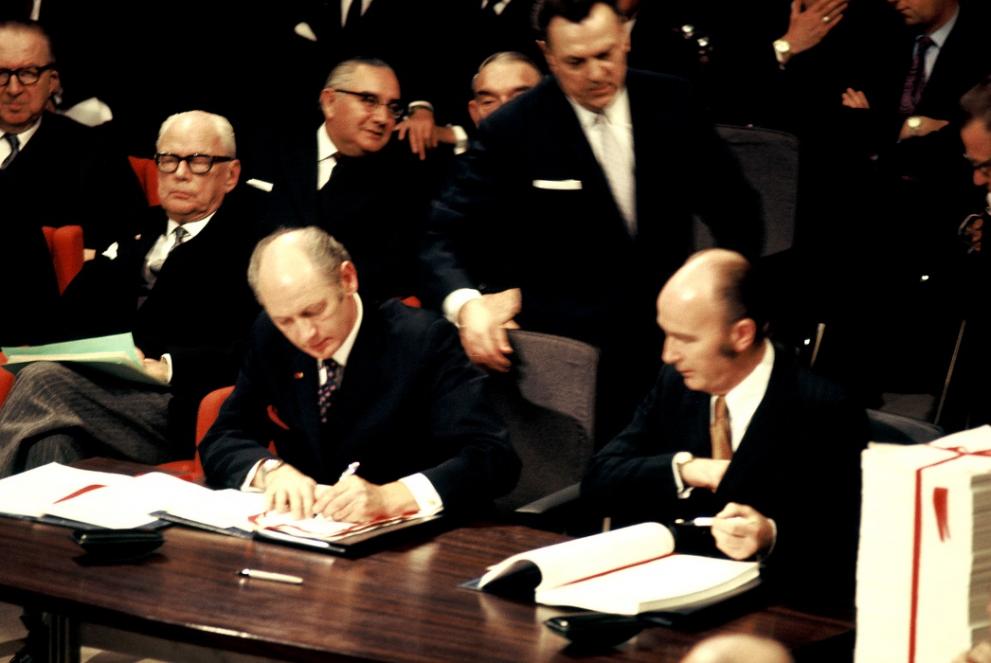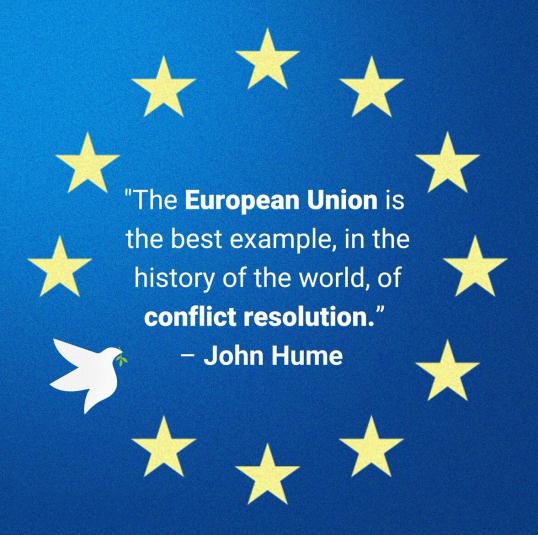Joining the European Community
The decision by the vast majority of the Irish people to join the European Communities (the European Coal and Steel Community, the European Economic Community and the European Atomic Energy Community) in 1973 has had an impact on our development as a nation that not even the most optimistic observer of the time could have predicted.
Back then Ireland was regarded by most of the global community as an almost insignificant island, still struggling to find its place in the world more than five decades after gaining independence from the UK.
In the years before becoming a member state, political leaders like Seán Lemass and later Jack Lynch, along with senior diplomats and economists, had argued that Ireland’s future lay within Europe.
However, Europe wasn’t so sure. Ireland’s agriculturally based economy was choked by its dependence on the UK market, and the country suffered from poverty, mass unemployment and emigration.
The founding six EEC countries expressed doubts about our economic capacity and our neutrality. Ireland’s policy of protectionism, which saw restrictions imposed on imports, certainly wasn’t very appealing to a European community with free trade at its heart.
Leading economists in Ireland had been campaigning for a shift in economic policy and by the early ‘60s many senior politicians were coming around to the idea that it was the only way to tackle the high unemployment and mass emigration that blighted the country.
Ireland continued to press for EEC membership but hopes were crushed in 1963 when then French President, General Charles de Gaulle, made it clear that France didn’t want Britain to join the community.
His stand brought an abrupt end to negotiations with all applicant countries and it was to be another decade before Ireland became a member of the EEC.
A second application in 1967 had been blocked again by President de Gaulle but in 1969 his successor, George Pompidou, promised not to stand in the way of British and Irish membership.
Fresh negotiations began and on January 22, 1972, the Treaty of Accession was signed. A referendum held in May 1972 confirmed Ireland’s entry into the European community with 83 per cent of voters supporting membership.
Ireland’s membership of the European Economic Community (EEC) which was to evolve into the European Union, officially began on January 1, 1973.

Ireland EU50: Then and now
Ireland is celebrating 50 years of EU Membership in 2023 and while the country has changed for the better over the last five decades, most Irish citizens aren’t old enough to remember what Irish life was like during the early 1970s.
Here are some of the ways being part of the European Union has helped Ireland transition to a strong, stable and more independent nation.
- Economy: In 1972 the Irish economy was largely agriculturally based and highly reliant on exports to the UK. EU membership granted farmers access to the more profitable Single Market and helped Ireland develop a more diverse, knowledge based economy with industries like pharmaceuticals, computer hardware and software and financial services contributing to strong GDP growth.
- Equality: Irish women were discriminated against when it came to work back in the 1970s. It was accepted that men were paid more and there was a marriage bar for women in public service jobs. European legislation on equality in the workplace has ensured that Irish men and women are entitled to equal pay for doing the same job. They also have legal protection when it comes to equal and fair treatment at work and both women and men are entitled to maternity and paternity leave.
- Emigration: Ireland has a long history of emigration with high net outward migration recorded in the 1950s through to the early 1970s. Most left seeking work in English speaking countries but by the end of the late 1970s, after Ireland became a Member State, more people were returning than leaving the country. Since then there have been periods of net outward migration but those seeking work abroad now have more opportunities. As EU citizens, Irish people can work or study freely in any Member State and their Irish qualifications are recognised throughout the European Union.
- Peace Process: The conflict in Northern Ireland was at its worst in 1972. There were 479 deaths recorded that year, of which 249 were civilians. The European Union has played a significant role in the Peace Process that exists today. The European Parliament provided a neutral political platform for Nationalists and Unionists, which paved the way for cross-border EU PEACE investment programmes for all-Ireland reconciliation projects in border counties. The EU is a strong supporter of the Belfast Agreement and insisted there would be no hard border on the island of Ireland during Brexit negotiations.
What being in the EU means for Ireland
- Irish businesses have unhindered access to a market of over 447 million people.
- The EU actively promotes and supports Europe’s many different cultures, traditions and languages. Irish has full working EU status, just like other official EU languages.
- Climate change is a global threat that can’t be tackled by nations acting alone. EU policies contribute to the global effort to tackle climate change and they also help protect Ireland’s natural habitats, ensure proper waste disposal and keep our air and water clean.
- Between 1973 and 2020 the Common Agricultural Policy invested €64.7 billion in supporting Irish farmers and rural community projects.
- In 1973 Ireland imported more merchandise than it exported. Imports were valued at €1.4 billion and exports €1.1 billion. In 2020 imports were valued at €85.3 billion and exports exceeded €160 billion.
- The EU is Ireland’s most important trading bloc, with 40% of exports going to fellow Member States.
- Being part of the EU gives Ireland a powerful global voice. Irish views and interests are reflected in the policies of the EU towards the rest of the world.
- Ireland has more control over its currency in the EU. The Irish pound was linked with British sterling until Ireland joined the European Monetary System (EMS) at its inception in 1979. The euro became the official shared currency of participating Member States including Ireland in 1999 and euro banknotes and coins first appeared in 2002.

